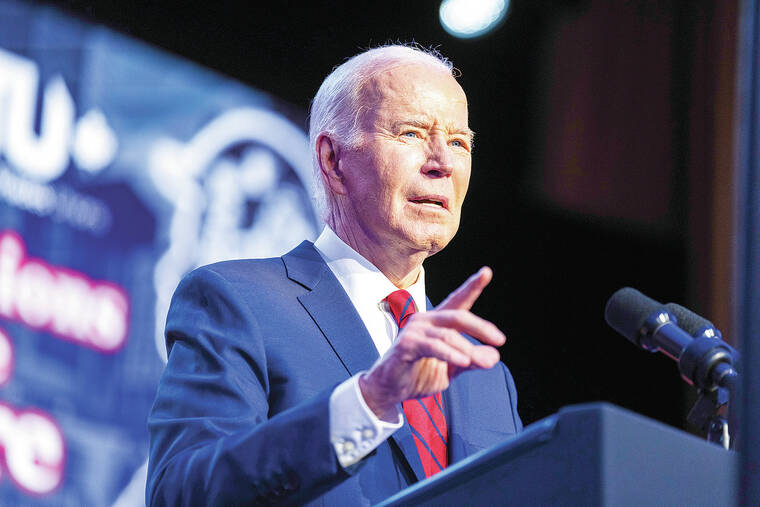Juggling campaign and foreign policy, Biden sends complicated messages
WASHINGTON — President Joe Biden just signed a bill that could ban himself from using TikTok. But Biden plans to keep using TikTok until his new law forces him off it.
His political team in Wilmington, Delaware, after all, considers TikTok a vital tool to reach young voters who could be crucial to his chances of winning reelection this fall. The problem is that his national security team in Washington considers the Chinese-owned social media site a threat to America that should be banned if it is not sold.
ADVERTISING
Reconciling those two imperatives left Biden’s government and campaign advisers laboring Wednesday to explain the competing rationales. But it is not the only time that Campaign Joe and Foreign Policy Joe have been at odds in recent months. Campaign Joe tells stories on the trail that Foreign Policy Joe’s staff then has to clean up — or try to ignore as best as possible. Campaign Joe prefers blunt talk. Foreign Policy Joe has to worry about diplomacy.
The disconnect is hardly unprecedented in an election year. Every president seeking a second term finds himself juggling two different jobs with two different imperatives at the same time: running the country and running for office. A candidate is focused on firing up supporters and tearing down the other side. A commander in chief has to worry about what might be best for the nation even if it is not necessarily best for his electoral chances.
The new TikTok law was part of a $95 billion foreign aid measure to provide arms to Ukraine and Israel for their ongoing wars and to bolster Taiwan against possible Chinese aggression. Under the law, TikTok’s Chinese owner, ByteDance, has to sell within 270 days, or about nine months, or shut down operations in the United States because of concerns over sensitive privacy information and propaganda. The president can extend that deadline to a year.
That means that Biden’s campaign can continue to use TikTok through the November election. Sullivan, the national security adviser, declined to say whether the campaign should leave the platform in the meantime. “I’m going to let campaigns decide for themselves what they’re going to do,” he told reporters Wednesday.
Karine Jean-Pierre, the White House press secretary, emphasized that TikTok did not necessarily face a ban if it could find a buyer. “We want to see a divestment,” she said. “We want to see it being sold, and we do not seek a ban.”
She added that the White House was not urging anyone to leave the platform in the interim. “We’re not saying that we do not want Americans to use TikTok,” she said. “We want to make sure it’s done in a way that we protect our national security and we protect Americans.”
But in fact, the Biden administration has told some Americans not to use TikTok, or at least limited how they use it. Last year, it banned federal employees from having TikTok on their government devices, a rule that applied to federal contractors and any personal devices used for federal work.


